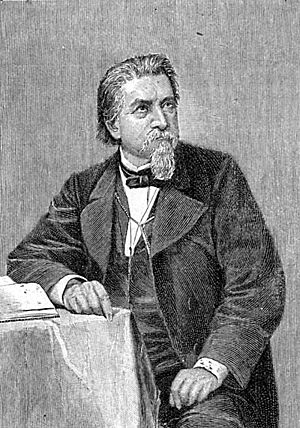Karl Gutzkow facts for kids
Karl Ferdinand Gutzkow (born on March 17, 1811, in Berlin – died on December 16, 1878, in Sachsenhausen) was an important German writer. He was a key figure in the Young Germany movement during the mid-1800s.
Contents
Early Life and Studies
Karl Gutzkow came from a very poor family. His father worked as a clerk in Berlin. His family was very religious and strict. Karl later began to question some religious ideas, possibly because of his strict upbringing.
In 1829, Gutzkow started studying theology and philosophy. He attended the University of Berlin. His teachers included famous thinkers like Hegel. He also studied at other universities, including Jena and Heidelberg.
Start of His Writing Career
While still a student, Gutzkow began his writing career. In 1831, he started a magazine called Forum der Journalliteratur. This work caught the attention of Wolfgang Menzel, another writer. Menzel invited Gutzkow to help edit his magazine, Literaturblatt.
In 1833, Gutzkow published his novel Maha-Guru, Geschichte eines Gottes. This was a fantasy story set in Tibet. He later moved to Frankfurt in 1835. There, he started another magazine called Deutsche Revue.
The "Young Germany" Movement
In 1835, Gutzkow published his novel Wally die Zweiflerin. This book explored new ideas about society and personal freedom. It questioned traditional views on marriage and religion. The book was influenced by the exciting changes happening in Europe at the time.
Soon after, the German Federal Assembly banned Gutzkow's writings. They also banned works by other writers like Heinrich Heine. This ban marked the beginning of the "Young Germany" movement. These writers wanted to bring about democratic changes in Germany.
Gutzkow was sentenced to three months in prison. He was also forbidden from working as an editor. The government wanted to stop his influence.
Later Works and Influence
While in prison, Gutzkow wrote a book called Zur Philosophie der Geschichte (1836). After his release, he moved to Hamburg. There, he began writing plays. His tragedy Richard Savage (1839) became very popular in German theaters.
Some of his other well-known plays include the comedies Zopf und Schwert (1844) and Das Urbild des Tartüffe (1847). His play Uriel Acosta (1847) was also very successful. In 1847, Gutzkow moved to Dresden. He became a literary advisor for the court theater there.
Gutzkow also continued to write novels. Die Ritter vom Geiste (1850–1852) is considered one of the first modern German social novels. This type of novel explores social issues.
In 1852, Gutzkow started a new magazine called Unterhaltungen am häuslichen Herd. It was similar to a popular English magazine. He continued this magazine until 1862.
Later Life and Legacy
In 1864, Gutzkow suffered an epileptic seizure. His health began to decline after this. He continued to write historical novels like Hohenschwangau (1868). He also wrote autobiographical sketches.
After another epileptic episode in 1873, Gutzkow traveled to Italy. He later returned to Germany and settled in Frankfurt. He passed away on December 16, 1878.
Gutzkow was a strong supporter of the emancipation of the Jews. His play Uriel Acosta became the first classic play translated into Yiddish. It was a very important play in Yiddish theater.
Karl Gutzkow was one of the first German writers to earn a living solely from his writing. His works greatly influenced German thought in his time. They offer a good look into the social and intellectual life of his generation.
Adaptations of His Work
Gutzkow's comedy Zopf und Schwert (1844) was adapted twice. In 1926, a movie called Sword and Shield was made. Later, in 1940, Edmund Nick used it for his operetta Über alles siegt die Liebe (Love Conquers Everything).
See also
 In Spanish: Karl Gutzkow para niños
In Spanish: Karl Gutzkow para niños
 | Janet Taylor Pickett |
 | Synthia Saint James |
 | Howardena Pindell |
 | Faith Ringgold |


